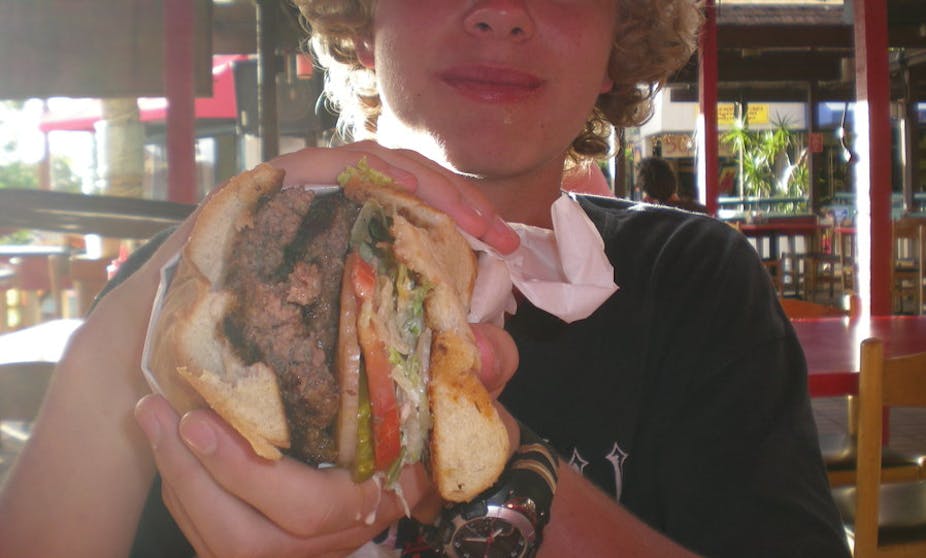When Jamie’s School Dinners first aired in early 2005, it launched Britain’s secondary schools as a key battle ground for politicians, professionals and campaigners keen to improve young people’s diet and stem the tide of obesity.
Turkey twizzlers were banned first. Then, in 2008, the government introduced strict new school food standards for all local authority-maintained schools in England. In these schools, chocolate, other confectionery and sweetened drinks could no longer be sold at all and the sale of less healthy products such as chips was greatly restricted. Wales, Scotland and Northern Ireland all have similar legislation.
But could this be doing more harm than good? Britain has long been considered entrepreneurial – or a nation of shopkeepers as Napoleon put it – and it now appears that prohibiting the sale of such a wide range of products in schools could have produced a new generation of shopkeepers operating illicitly in our school playgrounds and corridors.
According to new research published in Sociology, supposedly “common sense” restrictions on secondary school food may have created extensive black markets in junk food. The research identified extensive student-led “underground businesses” in prohibited food and drink in the six English secondary schools studied.
Illicit doughnut supply
Students and staff in these schools reported that the new restrictions on school food, as well as dissatisfaction with rushed and over-crowded canteens, had effectively created a perfect storm for black markets to flourish. The proliferation of supermarkets, including new high street stores very near secondary schools, has also helped fuel this illicit supply of high-calorie items, such as bags of doughnuts and cookies.
Supermarkets are effectively wholesalers, with students reselling their cheapest products within school to provide a service similar to that of a convenience store. New technologies, such as Blackberry Messenger (BBM), can also help them advertise what they have to sell in school that day and where they will be.
Meanwhile, secondary school managers, teachers and other staff appear to be turning a blind eye. They have few incentives to intervene to prevent or limit these black markets in food and drink. The focus is instead on school inspection reports, performance targets and “league tables”. Students’ diets and issues relating to obesity remain a very low priority for schools. In the six schools studied, students reported that their teachers ignored the illicit resale of food and energy drinks – even when it was occurring on a large scale.
There has been some media attention on how young people and others can profit in the wake of school food and drink bans. Last year, Educating Yorkshire, Channel 4’s brilliant fly-on-the-wall school documentary of Thornhill Community Academy, included some scenes of students smuggling in gym bags full of snack food and energy drinks to re-sell.
And earlier this year, The Daily Mail blew the whistle on a “car boot tuck shop” set up by a trader in Nottingham to take advantage of the demand for chocolate, sweets, crisps and fizzy drinks outside schools. Newspapers in the US have also reported how Michelle Obama’s school food reforms have spawned extensive junk food black markets.
We don’t need no education
Of course, schools have long been a place of resistance and these underground distribution systems are in one sense simply another form of rebellion against the highly constraining nature of secondary schools. But from a public health perspective, these findings are alarming as they suggest young people still have easy access (perhaps easier access than ever) to junk food, very cheap calorific snack products and energy drinks at school.
While some legislation to control certain behaviour has been highly effective for public health (for example, the banning of smoking in public spaces), there are also no shortage of examples where outright prohibition fuels new underground economies and greater harms. Most famously, in 1920s America as alcohol prohibition was resisted through black marketeering.
The new English School Food Plan – produced by Henry Dimbleby and John Vincent, the founders of the Leon restaurant chain – is full of great ideas and advocates simplifying the nutritional standards imposed on school canteens. But the same wide range of banned products would still stand under these plans.
To improve young people’s diet, we have to avoid simply driving problems underground. The most appropriate starting point for any school food policy is to give young people a greater voice and the opportunity to shape their environment more legitimately – rather than increasing restrictions until they set up their own convenience stores in school.
As with alcohol and tobacco, the government has to become more effective in intervening with the food industry to complement any work being done in schools. What supermarkets do around schools can’t continue to be completely ignored.
Perhaps most intriguing of all is that, for all the talk of evidence-based policy and using trials to establish what works, scientific principles such as equipoise – which acknowledges uncertainty of effects – that are routinely applied in the field of medicine are still largely ignored in public health more generally.
In this case, not only does no-one know if the current laws banning products in state-maintained schools in the UK actually work to improve diet, but there is also the possibility that they could be doing much more harm than good.

